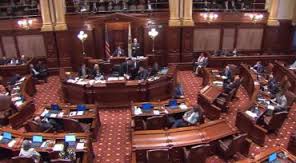6/2/2015
Much like Sunday’s last-minute drama in the U.S. Senate over extending parts of the Patriot Act to authorize the NSA-spying program, the Illinois legislature was hard at work Sunday night trying to patch together a massive budget gap before the end of its spring session. The results of the failed last-ditch effort to reconcile a $6.2 billion budget shortfall was at least as contentious, if not more so, than the efforts in Washington. The new budget takes effect on July 1st and the lack of a deal means that the Illinois House will reconvene on Thursday, June 4th and the Senate on June 9th. Illinois’ first-term Republican Governor, Bruce Rauner, has been adamant about cutting fiscal expenditures to the consternation of the Democratically-controlled legislature. Earlier in May, the state’s Supreme Court declared a measure that would have cut cost-of-living increases among other provisions for state-level retirees to be unconstitutional, adding an estimated $2.2 billion to the already massive shortfall. As noted by the judicial panel at the time, Rauner willingly allowed a sales tax measure to expire at the beginning of the year, touting the savings as an example of his desire to bring a new level of fiscal control to the indebted state. If an agreement is not reached before July 1st, the state comptroller may not be able to meet payroll for the second half of the month, and the school year, set to begin on August 10th, may be delayed until a budget deal is reached.

Photo courtesy of WGNTV
Although the legislators’ agreement to return to session during the recess signifies some measure of good-faith, Sunday’s session typified the hostility between the Governor and the state legislature throughout much of Rauner’s term in office. Senate President John Cullerton (D-Chicago) points out that it will be much harder to reach an agreement due to the change in procedural rules since the budget session expired Sunday night. Any agreement must now reach a three-fifths threshold to be approved. Cullerton said after the failure to reach a compromise, “It’s unlikely we can get anything done.”The Democrats final budget includes $36.2 billion in expenditures; a figure that Democrats acknowledge would face a $3 billion revenue shortfall. Rauner’s budget plan calls for only $32 billion. Rauner, the first Republican elected as governor since 1998, campaigned on a “turnaround agenda,” implementing reforms on worker’s compensation, right-to-work provisions as well as tax cuts. However, Cullerton said, “I want to work with him on his turnaround agenda but much of the agenda in its current form, its theme is middle-class workers lose and corporate CEOs win.” Cullerton responded to the stalemate in a statement, “Once again, we find ourselves trying to work with a governor who continues to run campaigns rather than run the state that elected him. Rather than roll up his sleeves and work on solutions, he dictates demands and threatens those who defy him.”
The Senator is likely referring to a multimillion dollar media campaign launched by Rauner’s office, blaming Democrats for the budget crisis. Early previews of the campaign indicate that Rauner’s main target is longtime House Speaker, Chicago Democrat Michael Madigan, who Rauner considers to be the ringleader of an “elite political class.” Rauner told WBEZ radio, “We’ve had financial instability in Illinois for years, for decades, and it’s because our government is so full of conflicts of interest and so full of mismanagement.” Madigan’s spokesman, Steve Brown, noted how the legislators will be conducting door-to-door campaigns as well as “delivering a report on the session and the accomplishments that were made, things we were able to pass. I’m not sure how well-received whatever this attack will be, how credible it will be, in that context.” Cullerton noted that the media campaign will likely lessen the prospects for a compromise to be reached. Illinois has, by far, both the largest budget deficit and the largest future debt liability, now estimated to be over $111 billion.
Sources:
Bloomberg Business – Tim Jones and Elizabeth Campbell
Reuters/Yahoo News – Karl Plume and Karen Pierog
Washington Times/AP – John O’Connor


Join the conversation!